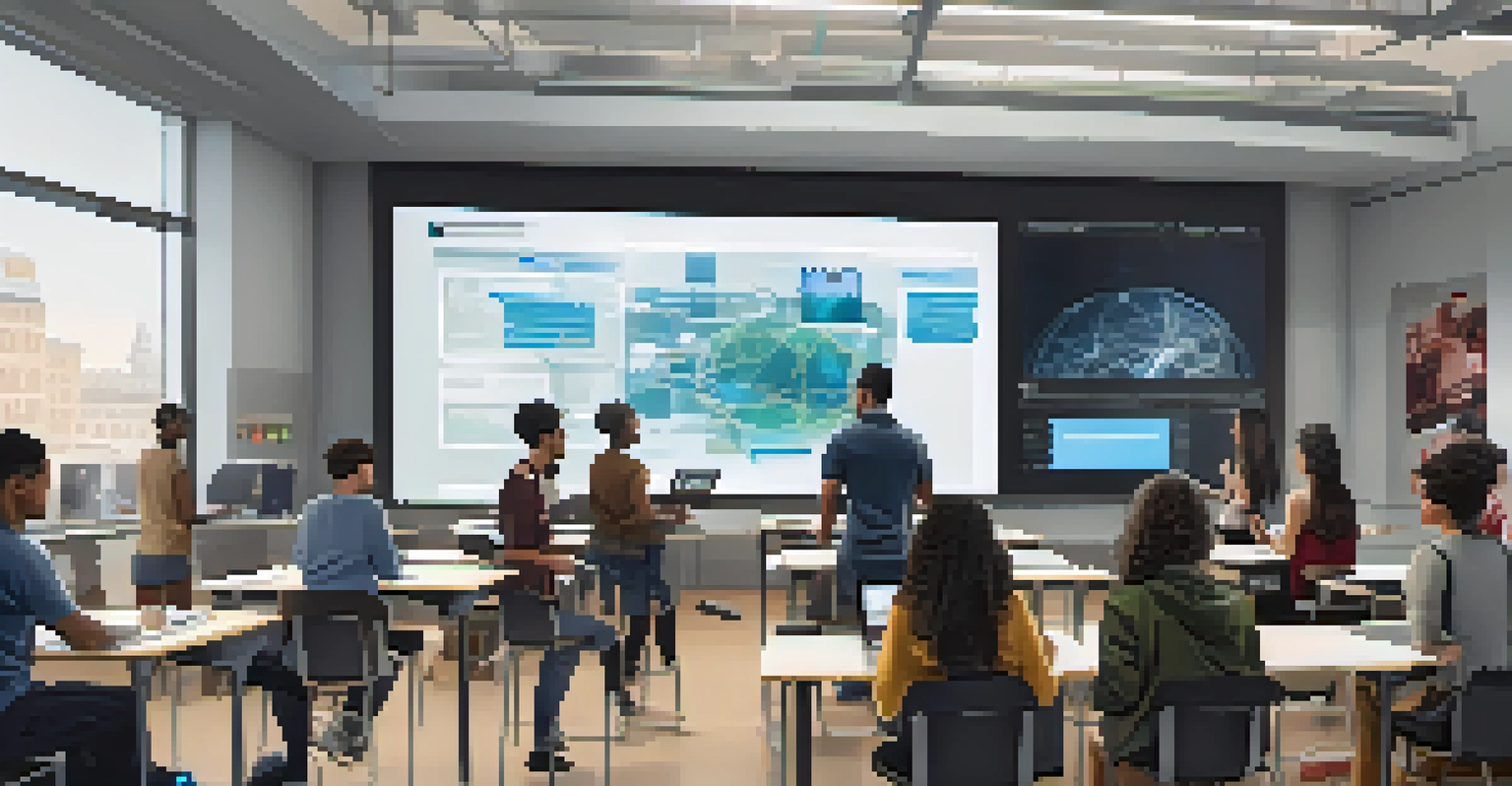Artificial Intelligence: Pittsburgh's Gateway to Innovation

Pittsburgh: A Historical Hub of Innovation
Pittsburgh has long been recognized as a center for innovation, rooted in its steel industry and later transitioning to technology. This city's rich history of transformation has paved the way for the current AI boom. With a blend of academic prowess and industry collaboration, Pittsburgh stands out as a fertile ground for artificial intelligence development.
Innovation distinguishes between a leader and a follower.
The city is home to renowned institutions like Carnegie Mellon University, which has been at the forefront of AI research for decades. These educational establishments not only produce top-tier talent but also drive groundbreaking research that fuels local startups and established companies alike. This symbiotic relationship between academia and industry creates a vibrant ecosystem for innovation.
Moreover, Pittsburgh's commitment to fostering innovation is evident in its numerous incubators and accelerators that support AI startups. As these new ventures emerge, they contribute to the local economy and enhance the city’s reputation as a tech hub. This rich tapestry of history and innovation positions Pittsburgh as a key player in the AI landscape.
The Role of Carnegie Mellon University in AI
Carnegie Mellon University (CMU) is a cornerstone of Pittsburgh's AI narrative. The university's School of Computer Science is consistently ranked among the best in the world, producing groundbreaking research and innovations. Students and faculty at CMU are not just theorists; they are actively engaged in solving real-world problems with artificial intelligence.

One of the university's notable contributions is the development of advanced machine learning techniques that are now widely used in various industries. This includes everything from robotics and autonomous vehicles to healthcare solutions. The hands-on approach at CMU ensures that students graduate with practical skills that are in high demand.
Pittsburgh: AI's Innovation Hub
Pittsburgh's rich history of industrial transformation and academic prowess makes it a key player in the artificial intelligence landscape.
Additionally, CMU fosters partnerships with local businesses, further bridging the gap between academia and industry. These collaborations often lead to innovative projects that benefit both students and the community. This interconnectedness reinforces CMU's role as a catalyst for AI innovation in Pittsburgh.
Pittsburgh's Thriving AI Startup Scene
The AI startup scene in Pittsburgh is vibrant and rapidly growing, attracting entrepreneurs from various backgrounds. With access to top talent from local universities and a supportive ecosystem, startups are flourishing in areas like healthcare, robotics, and cybersecurity. This environment encourages experimentation and the development of innovative solutions tailored to real-world challenges.
The best way to predict the future is to invent it.
Incubators such as AlphaLab and the Pittsburgh Technology Council provide essential resources for these startups, offering mentorship, funding, and networking opportunities. These organizations play a vital role in nurturing new ideas and helping entrepreneurs turn their visions into reality. As these startups gain traction, they contribute to the overall economic growth of the region.
Moreover, Pittsburgh's unique positioning allows startups to collaborate with established companies and research institutions. This synergy not only accelerates innovation but also enhances the city’s reputation as a breeding ground for cutting-edge technology. The result is a dynamic startup ecosystem that continually pushes the boundaries of what artificial intelligence can achieve.
Collaborations Driving AI Research Forward
Collaboration is key to Pittsburgh's success in the AI field, with numerous partnerships between academia, industry, and government. These collaborations often result in innovative projects that leverage the strengths of each partner. By working together, they are able to tackle complex problems that require diverse expertise and resources.
One prominent example is the partnership between CMU and local tech companies, which has led to advancements in machine learning and robotics. These projects not only advance research but also have practical applications that benefit society. Such initiatives demonstrate how collaboration fosters an environment of creativity and problem-solving.
Carnegie Mellon Drives AI Research
Carnegie Mellon University is a cornerstone of AI innovation, producing groundbreaking research and fostering partnerships with local businesses.
Additionally, government grants and initiatives support these collaborative efforts, providing the necessary funding for ambitious projects. By investing in research and innovation, Pittsburgh is laying the groundwork for a sustainable future in AI. This collaborative spirit is essential for maintaining the city’s position as a leader in the AI revolution.
AI Transforming Local Industries
Artificial intelligence is not just a buzzword in Pittsburgh; it's actively transforming local industries. From healthcare to manufacturing, AI technologies are being integrated to enhance efficiency and productivity. For example, hospitals are using AI to improve patient outcomes through predictive analytics and personalized medicine.
Manufacturers are also benefiting from AI by utilizing smart technologies that optimize production processes. These innovations help reduce waste and increase output, ensuring that Pittsburgh’s manufacturing sector remains competitive in a global market. The integration of AI in these industries highlights the technology’s versatility and potential.
Moreover, local businesses are increasingly adopting AI-driven solutions to improve customer experiences and streamline operations. By embracing these technologies, they are not only enhancing their services but also contributing to the overall economic development of the region. Pittsburgh's commitment to innovation ensures that AI remains a driving force in local industries.
Pittsburgh's Community and Inclusivity in AI
Pittsburgh is committed to fostering a diverse and inclusive AI community, recognizing that varied perspectives drive innovation. Initiatives aimed at increasing representation in tech are gaining momentum, ensuring that voices from all backgrounds are heard. This inclusivity is crucial for developing AI solutions that cater to a wide range of users and societal needs.
Organizations like Tech 4 America and the Pittsburgh Black Tech Fund work tirelessly to create opportunities for underrepresented groups in the tech industry. By providing mentorship, training, and resources, they empower individuals to pursue careers in AI and technology. These efforts contribute to a more equitable tech landscape in Pittsburgh.
Inclusive AI Community Growth
Pittsburgh is dedicated to building a diverse AI community, ensuring that underrepresented voices contribute to the development of technology.
As a result, the local AI community is becoming more vibrant and diverse, leading to richer ideas and innovations. This focus on inclusivity not only strengthens the community but also enhances the city's reputation as a welcoming hub for talent. Pittsburgh's dedication to fostering diversity ensures that the future of AI is shaped by a broad array of voices.
The Future of AI in Pittsburgh
Looking ahead, the future of AI in Pittsburgh is bright, with continued investment and innovation on the horizon. The city is poised to remain a leader in artificial intelligence, attracting talent and businesses from around the globe. As technology evolves, Pittsburgh's ecosystem is adapting to meet new challenges and opportunities.
Emerging trends such as ethical AI and responsible technology development are becoming focal points for researchers and businesses alike. This emphasis on ethical considerations ensures that AI advancements are aligned with societal values and needs. Pittsburgh's proactive approach to these issues will solidify its position as a responsible leader in AI innovation.

Additionally, ongoing collaborations between academia, industry, and government will drive further advancements in the field. By fostering a culture of innovation and inclusivity, Pittsburgh is set to continue being a gateway to AI and technological progress. The city’s commitment to a sustainable and ethical AI future will undoubtedly shape the landscape for years to come.